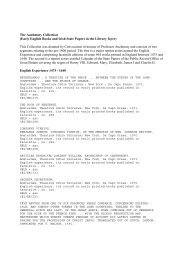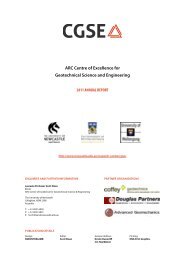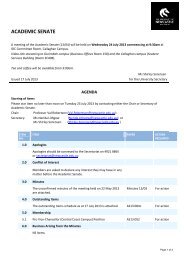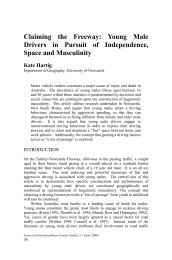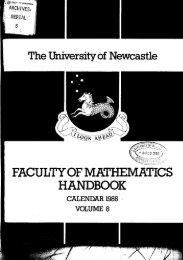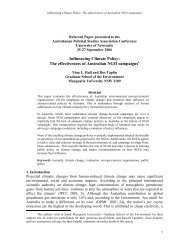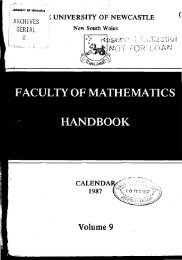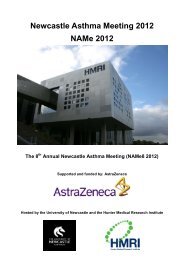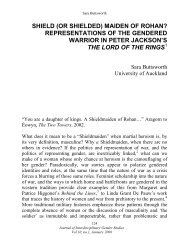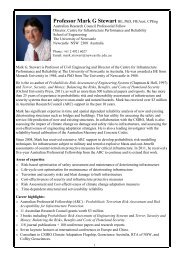n - University of Newcastle
n - University of Newcastle
n - University of Newcastle
Create successful ePaper yourself
Turn your PDF publications into a flip-book with our unique Google optimized e-Paper software.
Jlaring resicled for manr years in the island <strong>of</strong> Xaiatea, ancl<br />
ha~ing been in the coilstailt habit <strong>of</strong> conversing with and preacllin;<br />
to the 11atives in their o~rn tongue, I an1 enabled to trace the<br />
bimilarity <strong>of</strong> languages 11sed in the South Seas. one with another,<br />
roving they are hut diEerent dialects, aithough the natives themselves,<br />
and me also, at tbe first interriex-, could not understalld<br />
the people <strong>of</strong> neighbouriug islands, who speak radically the same<br />
tongue !<br />
In the Australian tongurs t11ei.e appears to exist; a very great<br />
similarity <strong>of</strong> i:iiom, as respects the dual number and the use <strong>of</strong><br />
tlle form expressive <strong>of</strong> neqation; and yet it is observed by a<br />
writer in the article on ' Greek language,' Xees's Cyelopmclia, that,<br />
" The dzcal n~rnzbel- is Zy no qjzralzs necessalm.y in Zunyuage, though<br />
it may enable the Greek to express the ilunlber 'two ' or 'pair' with<br />
lllore emphasis and precibion." But this assertion is not at all<br />
borne out by facts ; because, in this part <strong>of</strong> the hemisphere, all the<br />
languages <strong>of</strong> the South Sear, in comnlon with Kew South JJTales,<br />
possess a dual number, ailcl so esseiltial is it to the languages that<br />
conrersrttion couldilot be carried on, if they bad it not. There is,<br />
hoxr-ever, a peculiarity in the dual <strong>of</strong> the Australian tongue ~ hich<br />
does not exist in the islands, namely, a conjoined case in the dual<br />
pronouns, by which the nominative and accusative are tlencled, as<br />
shown io the pronouns*, whilst the verb sustains ro change,<br />
excepti~lg when reflexire, or reciprocal, or continu a t' we. But<br />
in the Islands there are dual rerbs. The inodes <strong>of</strong> interrogation<br />
and replication are very much alike in the idiom <strong>of</strong> both languages,<br />
and so peculiar as hardly possible to be illustrated in the English<br />
language; for they scarcely ever tire a direct ansv-er, but in such<br />
a manner as leaves much to be implied. The aborigines <strong>of</strong> this<br />
colony are far more definite in the use <strong>of</strong> the tenses than the<br />
Tslanders, who ha1.e nothing peculiar in the use <strong>of</strong> the tenses.<br />
The subject <strong>of</strong> teuses caused me much perplexity and diligent<br />
examination. Nor did the observations <strong>of</strong> eminent miters on<br />
the theory <strong>of</strong> language tend to elucidate the matter; because the<br />
facts existing in the language <strong>of</strong> the aborigines <strong>of</strong> Ke~r Holland<br />
are in direct coiltradictiou to a note to the article 'Grammar' in thc<br />
Ene!/clopedia Bq-itannieaf, where certain tenses are rep~esented<br />
as "peculiar to the Greek, and hare nothing cowesyo~zding to<br />
them ilt other tongzces, me need not scrnple to overloolc them as<br />
slr~~e?$zcous." Kom, our aborigiues use the tenses <strong>of</strong> the rerb and<br />
the participle variously, to denote time past in general; or time past<br />
in particular, as, ' this morning only;' or time past remote, that is,<br />
at some former period, as, 'when I was in England,' or, 'when I tras<br />
a bo?' The future tiwe <strong>of</strong> tlle verb and <strong>of</strong> the participle is also<br />
mod~fied in a similar manner, specifically, either now, or to-morrow<br />
# See page 17.-ED. + Of that day. -ED.<br />
THE AUTHOR'S PREFACE. vii<br />
morning, or generally as in fut~lrity ; and besides this, there is<br />
another curious fact opposed to the co~lclusion <strong>of</strong> the writer's<br />
note, which reacls thuri : " Of the paulo-post-futurum <strong>of</strong> the<br />
Greeks, \re have taken no notice, because it is fouild only in the<br />
passive ~oice ; to which if it were necessary, it is obrious that it<br />
\rould be necessary in all voices, as n vzan. azcr!/ be nbolrt to act, as<br />
well as to su,fe?-, i~iznzediafeTy." Sow, such is the rery idioul <strong>of</strong> this<br />
language, as n-ill be seen in the conjugation <strong>of</strong> the participle; for<br />
the pronolm, being used either objectirely or nomiuati\relp, will<br />
,place the phrase either in the one sense or the other, such chanqe<br />
in the pronoun constituting the equivalent t,) the passire roice<br />
or the active voice. The most particular attelltio~l is necessarr<br />
to the tense <strong>of</strong> the participle as well as that <strong>of</strong> the rerb, each<br />
tense being confined to its o~vil 11articular period, as shoivn in the<br />
conjugition <strong>of</strong> the rerbs. The various dialects <strong>of</strong> the bl~clis<br />
map yet pro~e, as is already ascertained in the Islands, to be a<br />
difliculty more apparent than real ; but nrhe11 one dialect becomes<br />
knoIvn, it mill asslst materially in obtaining a speedier lino\rledge<br />
<strong>of</strong> any other that may be attempted, timn if no such assistance<br />
had been rendered.<br />
Although tribes mithin 100 miles do not, at the first interrien-,<br />
understand each other, yet I hare observed that after a T-er?<br />
short space <strong>of</strong> time they are able to conrerse freely, which could<br />
not be the case were the langaage, as man suppose it to be,<br />
radically distinct. The number <strong>of</strong> d~fferent llanles for one substantive<br />
may occasion t?lis idea. For instance, ' n-ater ' lins at<br />
least fire names, and ' fire' has more ; the ' moon' has four names,<br />
according to her phases, and the karigaroo has dizti~ict names<br />
for either sex, or according to size, or different places <strong>of</strong> Iiaunt ;<br />
so that two persons would seldom obtoin the same name for a<br />
knngaroo, if met wild in the woods, unless every circumstalltial<br />
was precisely alilre to both inquirers." The quality <strong>of</strong> a thing is<br />
another source from xrhich a ~lalne is given, as ell as its habit<br />
or manner <strong>of</strong> operation. Thus, one man ~vouId call a nlusket<br />
' a thing that strikes fire ;' another would describe it as ' a thing<br />
that strikes,' because it hits an object; whilst a third ~ould<br />
name it ' a thing that rzakes a loud noise ;' and a fourth would<br />
designate it ' a piercer,' if the bayonet was fixed. Eence arises<br />
the difficulty to persons unaccluaiuted with the language in<br />
obtaining the correct name <strong>of</strong> that which is desired. For<br />
instance, a risitor one day requested the name <strong>of</strong> a .natire cat<br />
from MLGill, my aboriginal, n-ho replied m in 11 a r i 11 g ; the<br />
person was about to write down the word mi nn a r i n g, 'a<br />
native cat,' tvheu I prere~~ted the naturslist, observing that the<br />
word was not the name <strong>of</strong> the native cat, but a questioc, namelr,<br />
* There are other reasons for this diversity <strong>of</strong> language.-ED.



